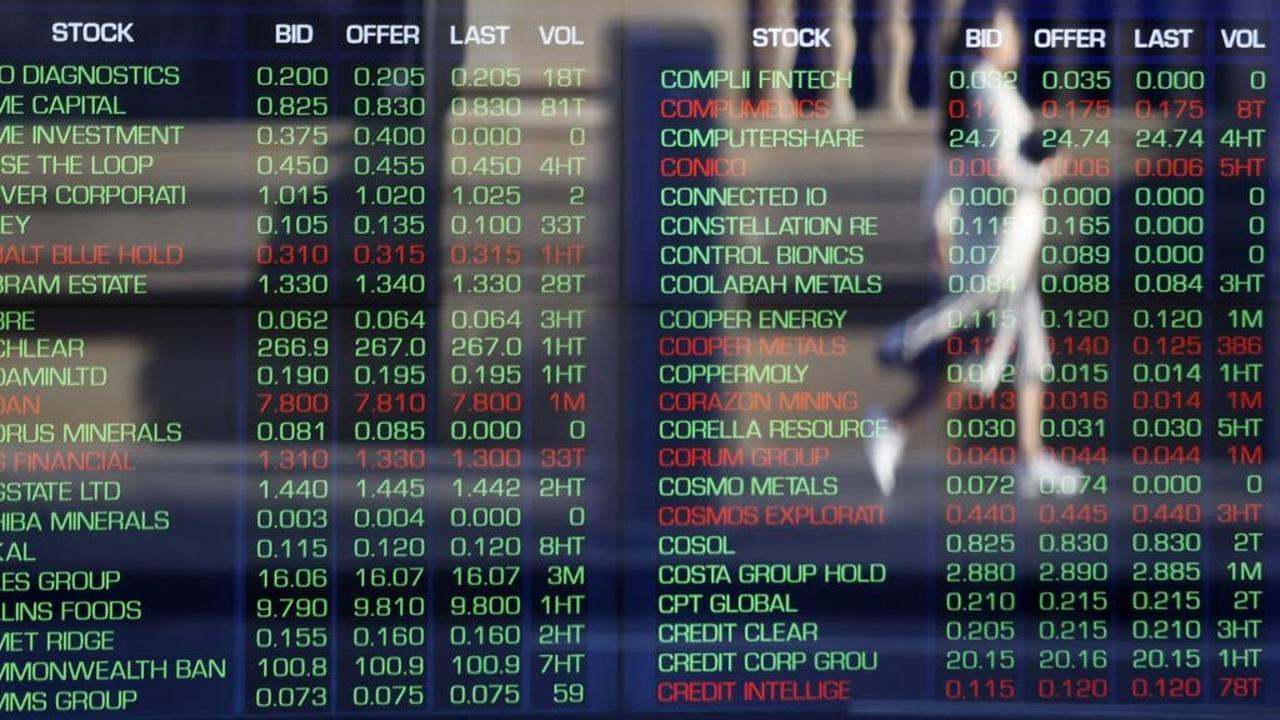Crazy viral video of buildings collapsing in China exposes worrying truth
A video of huge new tower blocks in China being demolished has gone viral – and the truth behind it is extremely worrying.

Companies
Don't miss out on the headlines from Companies. Followed categories will be added to My News.
It’s dramatic. It’s spectacular. But a viral social media video claiming to show the widespread demolition of failed Chinese building projects is more than what it seems.
Chinese property developer Evergrande defaulted on repayments for its $455 billion debt in 2021, triggering fears of a new global financial crisis. But its woes also exposed a nation filled with unwanted, unapproved and substandard building projects.
In this context, Communist Party officials ordered the company to demolish 39 high-rise buildings early last year. Permits for that part of an $18 billion Ocean Flower Island resort project on Hainan Island had reportedly been “illegally obtained”.
It’s reckless waste on an enormous scale.
But the viral video isn’t about Evergrande.
China destroying unfinished high-rises pic.twitter.com/f0UWjN0itd
— Fascinating (@fasc1nate) February 22, 2023
Not all of the high-rise demolitions are unfinished. Nor are they all part of a sudden demolition spree.
What the viral video exploits is the fallout from China’s explosive building boom over the past two decades. And the industry’s ongoing struggle with corruption and incompetence.
And the Evergrande crisis isn’t over yet.
Residential accommodation sales collapsed some 27 per cent last year. Investment in real estate, however, only fell 10 per cent. And shares in property developers have more than doubled over the past two months.
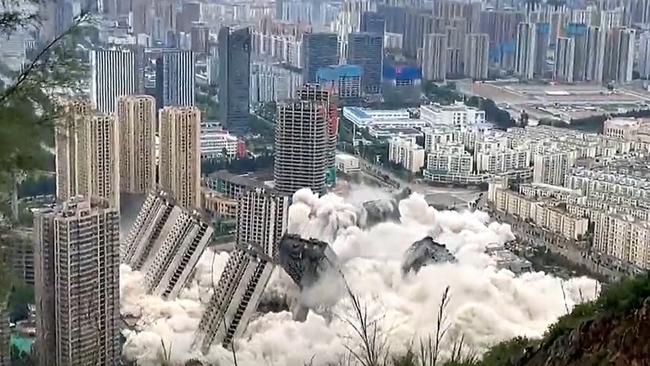
“The problems of the property developers’ facing severe financial difficulties are not yet addressed,” warns International Monetary Fund deputy director Thomas Helbling. “The issue of the large stock of unfinished housing more broadly is not yet addressed.”
But Beijing insists there is no problem. At least publicly.
“The market is not in a ‘crisis’ situation,” a statement from Zhengxin Zhang, Executive Director for the People’s Republic of China asserts. Instead, it is “a natural evolution of ‘deleveraging and destocking’ in the past few years.”
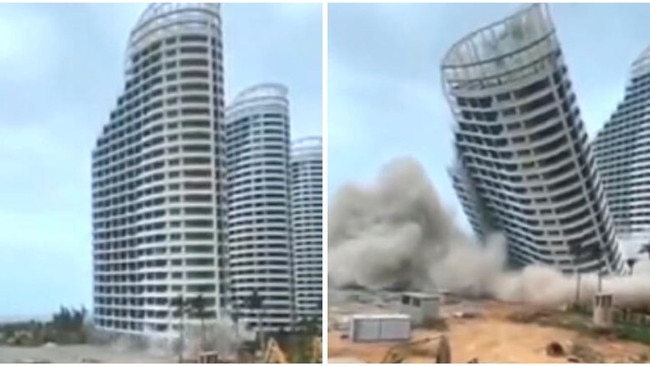
Boom and bust
If it’s big, dramatic, or spectacular … it will be recirculated on social media to lure eyeballs.
This video is a case in point.
The tower in its first demolition scene also appeared in the context of the 7.8 magnitude earthquake in Turkey earlier this month. Posts on Facebook and TikTok with comments like “Prayer for Turkey’s tallest building” drew tens of thousands of views.
But AFP tracked the origin of the footage to another Hainan Island demolition in 2020 – again blamed on corrupt local government approvals.
Another dramatic clip shows the destruction of 15 unfinished towers in Kunming, Yunnan Province, in 2021. The $1.3 billion development was part of the Liyang Star City Community development – one of many similar projects in the area that had failed to attract buyers for up to a decade.
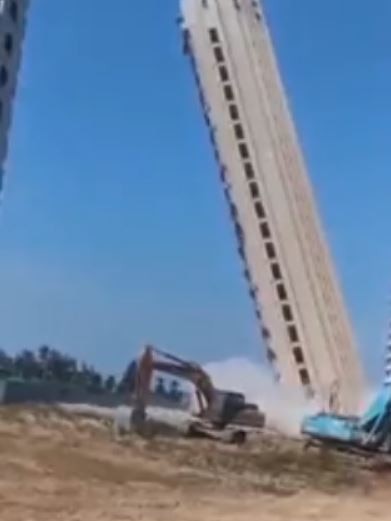
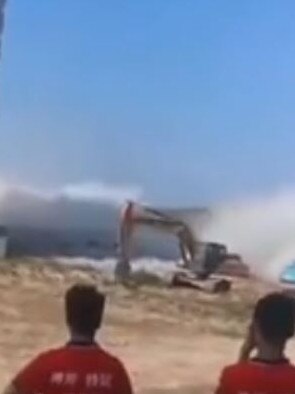
Most of the footage does fit the general theme of unwanted or illegal constructions. Though at least one was simply a spectacular piece of renovation work for the 2010 Shanghai World Expo.
But China’s still struggling to come to grips with the fallout of the most dramatic building bust in history. And that means more demolitions are likely to come.
Helbling warns Beijing must address the growing stockpile of unfinished apartments: “Otherwise, the sector will continue to slump and remain a risk and also constrain households that are overexposed to the property sector and will have cash tied up and their savings tied up, which will be a handicap for the broader economic recovery”.

It’s a common, capitalist, conundrum.
“When property prices seem only to rise year after year, businesses that overinvest in real estate outperform and eventually displace those that don’t, while the banks that lend directly or indirectly against real estate tolerate excessively risky loans on the assumption that their risks will be mitigated by continually rising prices,” warns Carnegie Endowment for International Peace analyst Michael Pettis.
“This happened in China.”
But the Chinese Communist Party has dismissed such concerns, insisting “the related risks are local and only concern individual firms”.
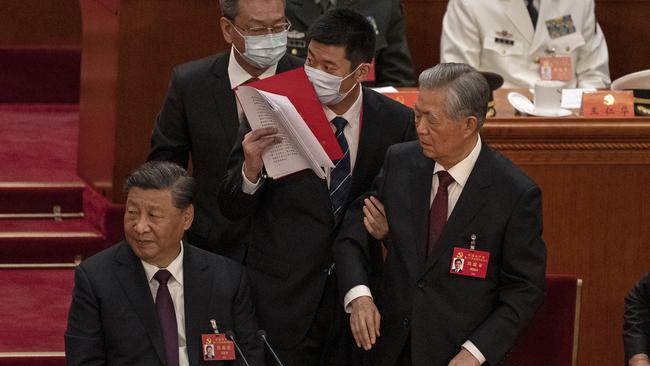
Unsteady ground
China’s property market represents between one-quarter and one-third of the nation’s GDP. But it’s been a millstone around Beijing’s neck ever since the Communist Party cracked down on spiralling property developer debts in 2020.
“Even if the property market recovers … as a consequence of the end of pandemic lockdowns, the recovery can only be partial and temporary,” says Pettis.
“In the medium term, property prices will continue to decline, and insolvencies will keep on emerging. Until the systemic problem is addressed and resolved, there can be no permanent stabilisation of China’s property market or its economy more generally.”
In the 1970s, Beijing realised it desperately needed new infrastructure on a grand scale to house, feed and employ its rapidly growing population. Meeting this generated an economic boom on a historic scale.
“This began to change ten to fifteen years ago, by which time China had largely closed the gap between the investment it had and the investment that the economy could productively absorb,” Pettis adds.
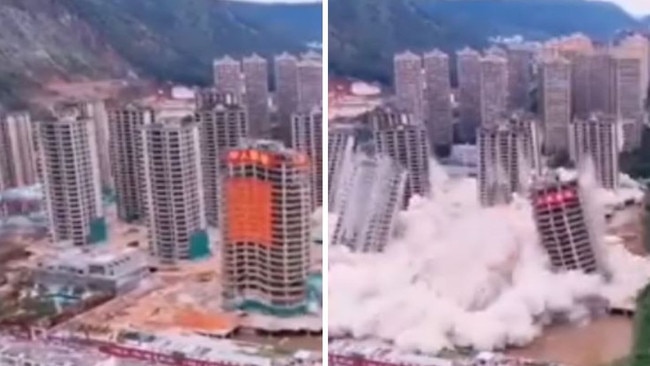
But the need to rebalance the economy away from investment (billionaires and institutions) and towards consumption (household incomes) proved unpopular in the halls of power.
So Beijing doubled down on driving investment by any means necessary.
And the easiest option appeared to be real estate.
“Like nearly every other country that has followed this model – China began to overinvest systematically in projects that contributed less to the economy than they cost,” says Pettis.
Beijing, he says, has reacted quickly to address liquidity problems. But it is yet to tackle “fundamental solvency concerns”.
“The various solutions and proposed solutions have merely transferred the problem from the local banks onto either local governments’ balance sheets or … onto the balance sheets of larger banks. But even if this works temporarily, it cannot go on forever.”
Jamie Seidel is a freelance writer | @JamieSeidel
Originally published as Crazy viral video of buildings collapsing in China exposes worrying truth





